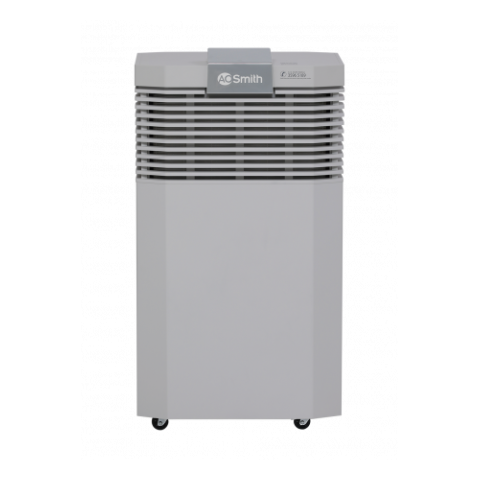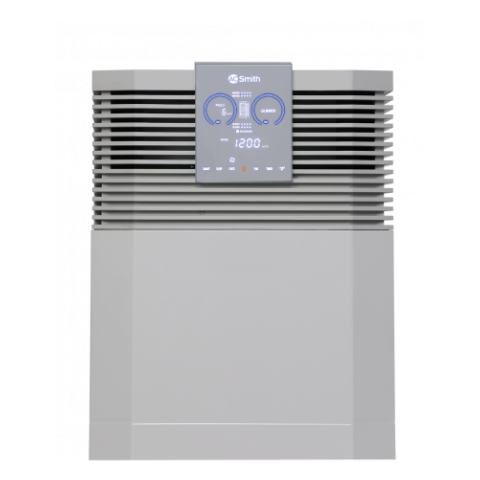Are you interested in getting an air purifier for your home? There are numerous factors which could affect an air purifier’s overall performance that you should take into account. We compiled a convenient list to help you choose the best air purifier for your needs.
1. Room Size

It might be easy to overlook but determining the size of the room and its designated function should be the first thing you do before shopping for air purifiers.
There are several ratings written on an air purifier’s specifications that will only make sense if you know the volume of your room. Determining the purpose of the room is just as important. An air purifier that’s good enough for your bedroom won't be enough when put in a room with higher levels of air pollutants such as a kitchen or a smoking area.
2. ACH

Air Changes Per Hour tells you the number of times an air purifier can filter the entire volume of air in a room in one hour. This rating can be used to compare the effectiveness of air purifiers for your room.
Different rooms have different ACH recommendations. For allergy management, ACH of 4 is minimum. Large rooms tend to require an ACH rating of around 6-8. The function of the room also dictates the amount of ACH needed. You will prefer higher ACH for clinics where many people come in and go. A regular sized hospital operating room requires an ACH rating of 15-20 given the need for a sterile environment.
3. CADR

Clean Air Delivery Rate determines the effectiveness of an air purifier based on how many cubic meters per hour (m3/h) or cubic feet per minute (CFM) of particulate matter it can filter. The higher the CADR value, the faster the air purifier is at filtering air. We recommend you get an air purifier with a CADR rating that will give you at least 4 Air Changes per Hour.
4. HEPA Filter

High Efficiency Particulate Air filters are mechanically pleated filters that are extremely effective at trapping and removing airborne particles, microorganisms and other contaminants from the air.
HEPA filters are tested to certify that it could remove 99.97% of airborne particles that are 0.3 microns. An air filter with a MERV rating of 17 and higher is classified as a HEPA filter. HEPA-like filters are tags given to filters with a MERV rating lower than 17, they may have “HEPA” in their name but they are not HEPA nor will they be as efficient as a True-HEPA filter.
5. Active Carbon and Formaldehyde Filtration

Formaldehyde is one of the most common Volatile Organic Compounds (VOC) that can be found in your home. VOCs have the potential to cause adverse health effects for people exposed to them. Headaches, dizziness, and memory impairment are only a few of the ailments one might experience after inhaling VOCs.
Active Carbon filtration is the safest and most reliable method used to remove VOCs from your indoor air. They remove gaseous pollutants through adsorption of gas molecules in the active carbon particle’s porous surfaces. Active carbon filters are also responsible for eliminating unwanted odors and smoke from indoor air. A good activated carbon air filter will have at least one kilogram of carbon.
6. Avoid UV and Ionizer

You may want to reconsider air purification technologies that can produce ozone as a byproduct or use ozone as a primary method of cleaning. Prolonged exposure to high concentrations of ozone is known to cause and worsen respiratory ailments. Children and infants are the most susceptible to the bad effects of ozone.
UV-C light and Ionizing air purifiers are known to produce ozone. Exposure to ozone is not only bad for your health but it can also damage sensitive wiring, electronics, and plumbing inside your home. It is best to avoid this technology for domestic air cleaning purposes.
7. IAQ Sensors and Indicators

Indoor Air Quality Sensors and Indicators are key components of any modern air purifier. High quality sensors will accurately measure indoor air quality to work in conjunction with the device's programming for more efficient performance. IAQ indicators will let you know the real time conditions detected by the sensors.
Particulate matter sensors use laser scattering technology to calculate the concentration of suspended air particles in a room. Most sensors used in air purifiers are calibrated to detect particulate matter that are 2.5 microns in diameter.
Good gas sensors can detect formaldehyde without being interrupted by ethanol or perfumes.
Look for air purifiers with premium quality PM2.5 and gas sensors, as well as user friendly IAQ displays.
8. Automatic Operation

Not all air purifiers are smart enough to adjust its speed according to the indoor air quality. Smart air purifiers use accurate real time sensors to detect pollution level and adjust the speed of air intake to provide good air quality at minimal noise.
The ability of an air purifier to automatically adjust the intensity of its performance has the added benefits of longer filter lifespan, reduced energy consumption, reduced noise and better sleep.
Some air purifiers also have a "quiet mode" for maintaining indoor air quality in situations that require a silent environment.
9. Consumables

HEPA and active carbon filters are meant to be regularly replaced to achieve continuously good air quality. If a seller claims you don't need to replace the filters, then it is not a true HEPA air purifier and it is using stages that may compromise the air quality.
Some air purifiers will just stop operating after a given number of hours and ask you to change filters. Better air purifiers have lifespan indicators that will let you know when a filter is nearing the end of its lifespan. This will give you ample time to procure consumables. A good lifespan for HEPA filters is about a year or more.
The CCM rating (Cumulative Clean Mass) is a metric used to determine the long-term effectiveness of an air purifier. It refers to the quality of cleaning an air filter can deliver after its CADR is reduced to half of its original value. Use CCM to gauge how your air filter will perform after long and heavy usage. High quality air filters have high CCM values. We recommend that you choose an air purifier with the highest CCM ratings of P4 and F4. Then you are guaranteed good performance in removing particulate matter and formaldehyde throughout the life of the appliance.
It is also important not to overlook the availability of an air purifier's filters. Can you afford the upkeep of replacing it? Can it be locally sourced or does it need to be shipped from overseas? Is the filter in question still in production? Remember that an air purifier will not be as effective with an exhausted air filter.
10. The Brand

In the Philippines, we think American, Japanese, or German brands are high quality and Chinese brand as low quality. Because of this, some local companies use this marketing strategy to subtly exaggerate the perceived quality of their products even when these are actually cheaply sourced from China.
While some of these products might not be bad at all, it is better if the seller is transparent about this and does not use deceptive practices.
In light of recent events, some sellers have also played up the global COVID-19 pandemic to aggressively sell their air purifiers. While it has been known for a long time that True-HEPA filters can remove viruses from the air, some sellers exploit the fear and urgency of consumers in order to sell their lower end non-HEPA rated devices.
Now You're All Set
Whether at home or in the workplace an air purifier is always a good investment. Air purifiers can protect people from harmful air contaminants such as smoke, viruses, and toxic odors. People that are vulnerable to allergies and breathing difficulties will benefit greatly from the clean indoor air quality delivered by an air purifier. Be sure to check these 10 important factors when shopping for an air purifier so you can properly choose which one will work for you.
Sources:
https://www.howtohome.com/how-often-should-i-change-my-air-purifier-filter/
https://www.aosmith.com.ph/blog/are-uv-air-purifiers-right-you
https://www.aosmith.com.ph/blog/voc-and-formaldehyde-why-its-bad-indoor-air-and-what-do-about-it
https://www.aosmith.com.ph/blog/why-you-might-not-want-ionizing-air-purifier
https://www.aosmith.com.ph/blog/buying-air-purifier-why-hepa-standard-matters
https://www.aosmith.com.ph/blog/can-hepa-air-purifiers-protect-you-against-covid-19




